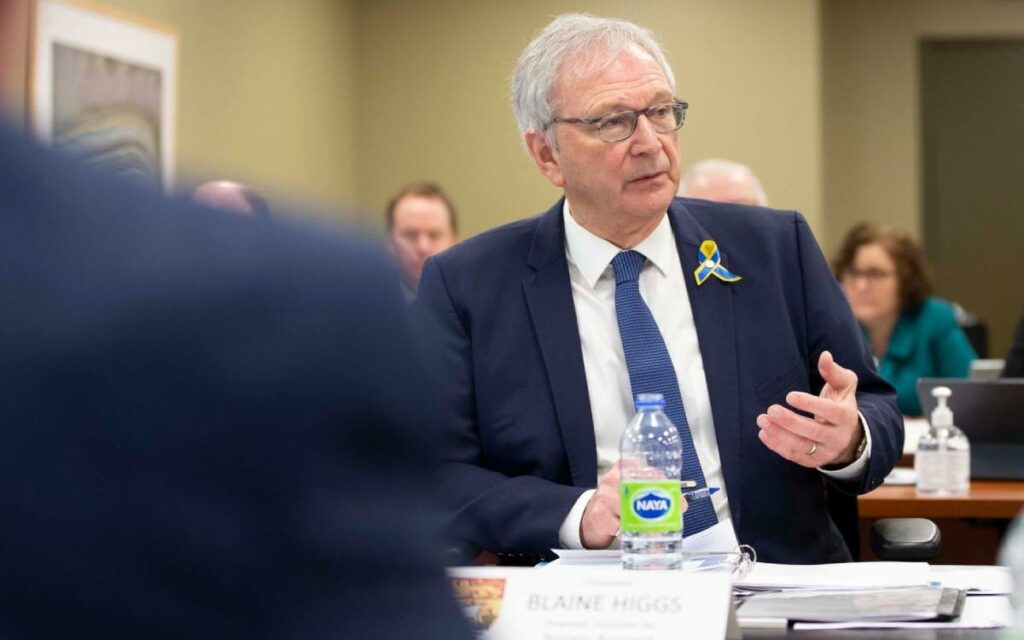
In the ongoing battle to bring common sense back into Canadian classrooms, Saskatchewan and New Brunswick are leading the charge. Pictured is New Brunswick Premier Blaine Higgs at a meeting of the Council of Atlantic Premiers in March 2022. Photo credit: Communications Nova Scotia
Earlier this week, Saskatchewan joined New Brunswick in defending parental rights in situations where children under 16 may want to change their pronouns, names or gender orientation in schools. Provincial Education Minister Dustin Duncan said Tuesday that the province was acting to standardize pronoun and naming policies as they were not consistent across schools in Saskatchewan. Back in June, the province of New Brunswick made similar changes in the form of Policy 713, and was the first province to do so.
As expected, criticism from the LGBTQ community, leftists, some teachers and some politicians has rained down on both provinces, claiming that some students will be disadvantaged by this policy despite the fact that both provinces have put in place measures to support students who are fearful of informing their parents. Even Justin Trudeau opted to weigh in with his usual melodramatic manner, stating that “far right political actors are trying to outdo themselves with the types of cruelty and isolation they can inflict on these already vulnerable people”. Conjuring up the spectre of the “far right” seems to be the latest gambit of the federal Liberal Party in many situations these days as their support among Canadians continues to decline. According to the Liberals, it seems that anyone who is not a card-carrying Marxist is defined as “far right”.
New Brunswick Premier Blaine Higgs has hung in defending these changes despite criticism, including from some of this own Ministers. Public opinion polls in New Brunswick indicate that a majority of citizens agree with Higgs on this issue. Hopefully Saskatchewan will do the same, and the fact that more than one province has introduced this policy will bolster Higgs’ case. Saskatchewan’s move was undoubtedly hastened by the recent scandal concerning a presentation that Planned Parenthood made to Grade 9 students in June which involved making highly inappropriate sexual content available to students. Planned Parenthood has been banned from Saskatchewan schools as a result.
Saskatchewan also announced new rules about sex education in general. Parents and guardians must now be informed about a school’s sex education curriculum and have the ability to decline their child’s participation. In addition, any involvement with third-party organizations related to sex education must be paused.
The basic issue is one of parental rights versus those of the education system or third-party groups promoting a certain agenda. It is absurd to think that parents would not be given primacy, and that important information about their child might be kept secret by teachers or others. As Minister Duncan said, “If we are requiring school divisions to get parental consent for a half-day field trip to the science centre, I think we need to be treating this issue with the same amount of seriousness.” Another consideration is the sexualization of young children. Kids are exposed to enough inappropriate content on the internet and social media these days. They don’t need to be bombarded with it in school as well.
Another key issue is the purpose of the educational system overall. It seems like an inordinate amount of classroom time is spent on social justice issues instead of teaching the basic skills young people will need to succeed in future. To varying degrees across provinces, our public education system is letting students down and not preparing them adequately for post-secondary education or the world of work.
This is why the organization I am President of, The Coalition of Concerned Manufacturers and Businesses of Canada, has created an offshoot organization called Canadians for Excellence in Education. A failed education system has dire economic implications for any country, not to mention the negative impacts on the success of future generations.
It is encouraging that now two provinces have gotten back to some common sense with respect to education and have not bowed to the voices of extreme political correctness. Hopefully more jurisdictions will follow. Two down, eight to go.

She has published numerous articles in journals, magazines & other media on issues such as free trade, finance, entrepreneurship & women business owners. Ms. Swift is a past President of the Empire Club of Canada, a former Director of the CD Howe Institute, the Canadian Youth Business Foundation, SOS Children’s Villages, past President of the International Small Business Congress and current Director of the Fraser Institute. She was cited in 2003 & 2012 as one of the most powerful women in Canada by the Women’s Executive Network & is a recipient of the Queen’s Silver & Gold Jubilee medals.






